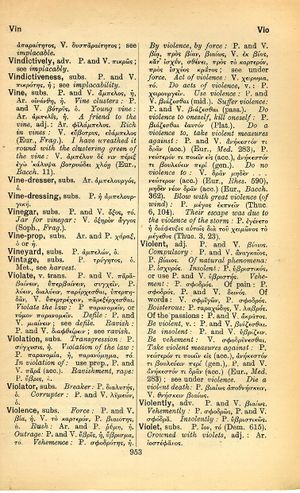vinegar: Difference between revisions
From LSJ
ὤδινεν ὄρος, Ζεὺς δ' ἐφοβεῖτο, τὸ δ' ἔτεκεν μῦν → the mountain was in labor — even Zeus was afraid — but gave birth to a mouse
m (Text replacement - "<b class="b2">Frag.</b>" to "''Frag.''") |
m (Woodhouse1 replacement) |
||
| Line 1: | Line 1: | ||
{{Woodhouse1 | {{Woodhouse1 | ||
|Text=[[File:woodhouse_953.jpg|thumb|link={{filepath:woodhouse_953.jpg}}]] | |Text=[[File:woodhouse_953.jpg|thumb|link={{filepath:woodhouse_953.jpg}}]] | ||
===substantive=== | |||
P. and V. [[ὄξος]], τό. | [[prose|P.]] and [[verse|V.]] [[ὄξος]], τό. | ||
[[jar for vinegar]]: [[verse|V.]] [[ὀξηρὸν ἄγγος]] ([[Sophocles|Soph.]], ''Fragment''). | |||
}} | }} | ||

